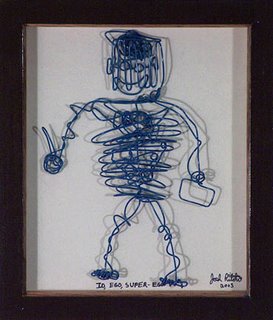 When they write my obituary. Tomorrow. Or the next day. It will say, "Gary Freedman is survived by an apartment full of shit." I'm surprised I haven't been buried alive. I have to struggle to keep a path clear between couch and toilet, toilet and table, table and front door. If I want to get from the toilet to the front door, I have to go by way of the table. I like to imagine the couch as home plate, the toilet as first, the table as second, the front door as third: should the doorbell ring while I am lying on the couch, I have to round the toilet and the table in order to arrive at the door. If it happens to be Stanley Schmulewitz, I let him in without a word and then jog back to the couch, the roar of the invisible crowd ringing in my ears. Stanley Schmulewitz, who has lived in the building for the past thirty-six years, is president of the tenants association.
When they write my obituary. Tomorrow. Or the next day. It will say, "Gary Freedman is survived by an apartment full of shit." I'm surprised I haven't been buried alive. I have to struggle to keep a path clear between couch and toilet, toilet and table, table and front door. If I want to get from the toilet to the front door, I have to go by way of the table. I like to imagine the couch as home plate, the toilet as first, the table as second, the front door as third: should the doorbell ring while I am lying on the couch, I have to round the toilet and the table in order to arrive at the door. If it happens to be Stanley Schmulewitz, I let him in without a word and then jog back to the couch, the roar of the invisible crowd ringing in my ears. Stanley Schmulewitz, who has lived in the building for the past thirty-six years, is president of the tenants association.I often wonder who will be the last person to see me alive. If I had to bet, I'd bet on Pius Cookson, the building engineer. Pius Cookson has been the engineer for at least the last sixteen years. He lives with his family down the hall from my apartment. I pass him in the hall a few times a week, entering or exiting his apartment. Twice a year, once in the spring and once in the fall, Pius Cookson enters my apartment to change the filter in the heating/cooling unit. Whenever he comes, I make a big production of the affair. After all, it happens only twice a year and I get few visitors. He stands at the door holding the filter while I wonder if this is the night I'll finish off my daily spaghetti, climb into bed, and have a heart attack in my sleep.
I try to make a point of being seen. Often when I'm out I'll buy a juice, even if I'm not thirsty. If the store s crowded, I'll sometimes go so far as to drop my change all over the floor, the nickels and dimes skidding in every direction. I'll go into the Athlete's Foot and say, "What do you have in sneakers?" The clerk will look me over like the poor schmuck that I am and direct me to the one pair of Rockports they carry, something in spanking white. "Nah," I'll say, "I have those already," and then I'll make my way over to the Reeboks and pick out something that doesn't even resemble a shoe, a waterproof bootie, maybe, and ask for it in size 11. The kid will look again, more carefully. "Size 11," I'll repeat, holding his gaze while I clutch the webbed shoe. He'll shake his head and go to the back for them, and by the time he returns I'm peeling off my socks. I'll roll my pant legs up and look down at those decrepit things my feet, and an awkward minute will pass until it becomes clear that I'm waiting for him to slip the booties onto them. I never actually buy. All I want is not to die on a day when I went unseen.
A few months ago, I saw an ad in the paper. It said, "NEEDED: NUDE MODEL FOR DRAWING CLASS. $15 AN HOUR." It seemed too good to be true. To have so much looked at, by so many. I called the following Tuesday. I tried to describe myself, she wasn't interested. "Anything will do," she said.
The days passed slowly. I told Stanley Schmulewitz about it, but he misunderstood. He thought I was signing up for a drawing class in order to see nude girls. He didn't want to be corrected. "Their breasts?" he asked. "They show their boobs?" I shrugged. "And down there?"
After Maxine Krieger on the fourth floor died of a massive stroke and it took three days for anyone to find her, Stanley Schmulewitz and I got into the habit of checking on each other. We'd make little excuses--"I ran out of toilet paper," I'd say when Stanley Schmulewitz opened his door. A day would pass. There would be a knock on my door. "I lost my TV Guide," he'd explain, and I'd go and find him mine, even though I new his was right where it always was, on his couch. Once, he came down on a Sunday afternoon. "I need a cup of flour," he said. It was clumsy, but I couldn't help myself. "You don't know how to cook," I said. There was a moment of silence. Stanley Schmulewitz looked me in the eye. "What do you know," he said. "I'm baking a cake."


